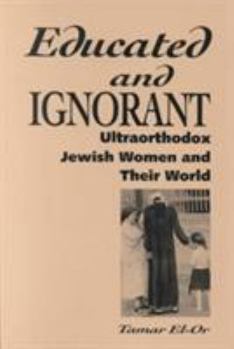Educated and Ignorant: Ultraorthodox Jewish Women and Their World
Select Format
Select Condition 
Book Overview
This ethnography investigates the meaning of learning in the lives of ultra-orthodox Jewish women. Presenting a picture of the Gur Hassidic community in Israel, the author explores the relationship... This description may be from another edition of this product.
Format:Hardcover
Language:English
ISBN:1555873936
ISBN13:9781555873936
Release Date:January 1994
Publisher:Lynne Rienner Publishers
Length:228 Pages
Weight:1.10 lbs.
Customer Reviews
1 rating
the title tells you what this is about...
Published by Thriftbooks.com User , 20 years ago
A secular feminist spends time with the women of a small Hasidic sect in Israel, and proclaims that the women are undereducated and subordinated; although the sect does make some effort to educate its likable-but-ignorant housewives about Judaism, their Torah education is far shallower and less theoretical than that of their husbands. But I gave this book 4 stars instead of 2 or 3 because it is surprisingly readable and because a few small surprises lurk here and there: *The shallowness of the sect's adult education seems to be at least partially a response to consumer demand; the women are bored by more theoretical teachers, and prefer instruction in "nuts and bolts" halacha. Perhaps the sect's dual standard is a pragmatic necessity: because the women are busier than the men (many of whom are full-time scholars subsidized by the sect or by the Israeli government), they simply do not have time or inclination for as much in-depth learning. *The book discusses the far less studied issue of the relations between the sect and other ultra-Orthodox groups: generally, the boundaries between groups are fairly fuzzy, but a few of the more extreme sects are exceptions to this rule. *There doesn't seem to be a particularly strong correlation between ritual rigidity and tolerance of deviation. Some of the less rigid sect members are quickest to condemn deviations from their standard of observance, while some of the strictest are less judgmental and more tolerant.






